部编版小学五年级英语下册期末知识点汇总
- 格式:pdf
- 大小:15.49 KB
- 文档页数:10
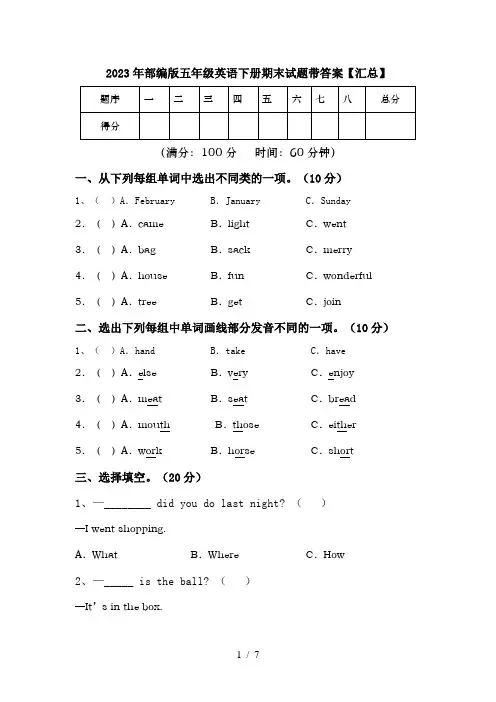
2023年部编版五年级英语下册期末试题带答案【汇总】(满分:100分时间:60分钟)一、从下列每组单词中选出不同类的一项。
(10分)1、()A.February B.January C.Sunday 2.()A.came B.light C.went 3.()A.bag B.sack C.merry 4.()A.house B.fun C.wonderful 5.()A.tree B.get C.join二、选出下列每组中单词画线部分发音不同的一项。
(10分)1、()A.hand B.take C.have2.()A.else B.very C.enjoy 3.()A.meat B.seat C.bread 4.()A.mouth B.those C.either 5.()A.work B.horse C.short三、选择填空。
(20分)1、—________ did you do last night? ()—I went shopping.A.What B.Where C.How2、—_____ is the ball? ()—It’s in the box.A.What B.Where C.How3、Shenzhen and Shanghai are both big _____. ()A.cities B.city C.towns4、—Who's that woman? ()—_______is my mother.A.She B.He C.It5、Children's Day is June. ()A.in B.at C.on6、Here _______ a glass of _______ for you. ()A.is; juices B.is; juice C.are; juice7、—____ in the playground? ()—There ____ a football and two basketballs.A.What’s; are B.Where’s; are C.What’s; is8、Let’s _________ a birthday card for our mother. ()A.make B.making C.makes9、I have breakfast _____ six thirty _____ the morning.()A.on; in B.at; on C.at; in10、My mother is a teacher. She goes to school ___ 7:00 ___ the morning.()A.at; on B.at; at C.at; in四、用所给单词的适当形式填空。
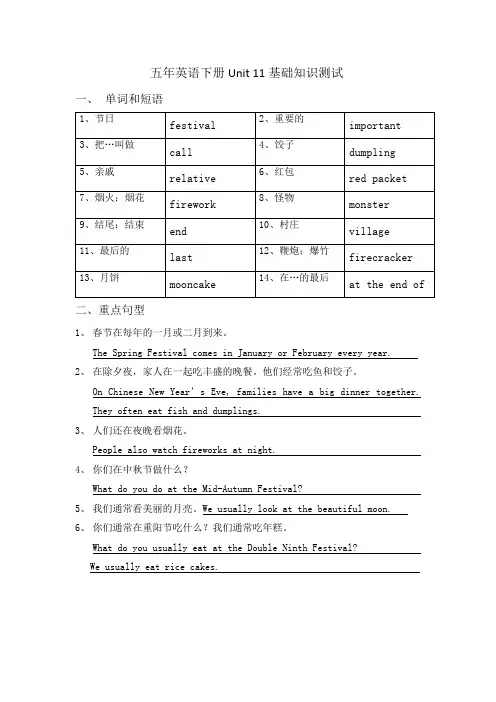
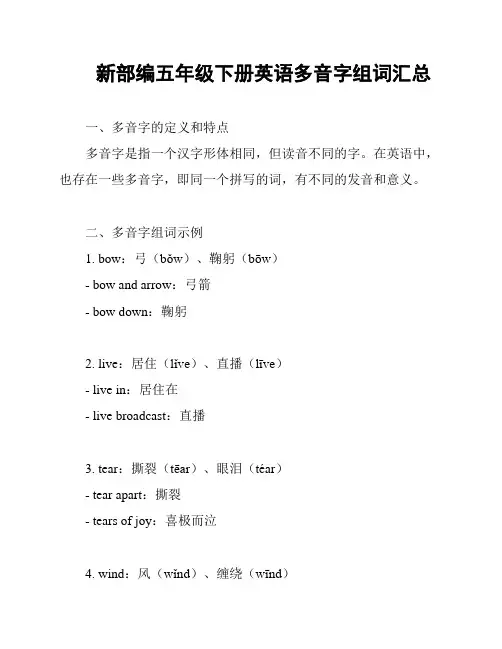
新部编五年级下册英语多音字组词汇总一、多音字的定义和特点多音字是指一个汉字形体相同,但读音不同的字。
在英语中,也存在一些多音字,即同一个拼写的词,有不同的发音和意义。
二、多音字组词示例1. bow:弓(bǒw)、鞠躬(bōw)- bow and arrow:弓箭- bow down:鞠躬2. live:居住(lǐve)、直播(līve)- live in:居住在- live broadcast:直播3. tear:撕裂(tēar)、眼泪(téar)- tear apart:撕裂- tears of joy:喜极而泣4. wind:风(wǐnd)、缠绕(wīnd)- wind blowing:风吹- wind around:缠绕5. read:阅读(rèad)、读(rīad)- read a book:阅读一本书- read aloud:大声朗读6. lead:铅(lèad)、引导(lēad)- lead pencil:铅笔- lead the way:引领7. close:关闭(clǒse)、亲近(clōse)- close the door:关闭门- close friends:亲密的朋友8. object:物体(ǒbject)、反对(obʤect)- object to:反对- object lesson:物体课9. minute:分钟(mǐnute)、微小(mīnute)- a few minutes:几分钟- minute details:微小的细节10. wound:伤口(wǒund)、缠绕(woʊund)- gunshot wound:枪伤- wound bandage:绷带三、总结通过研究多音字组词,有助于加深对英语语音的理解和词汇的运用。
在使用这些多音字时,要根据上下文来确定其具体发音和意义,避免产生歧义。
请学生们在课后进行更多的练,以提高对多音字的掌握程度。
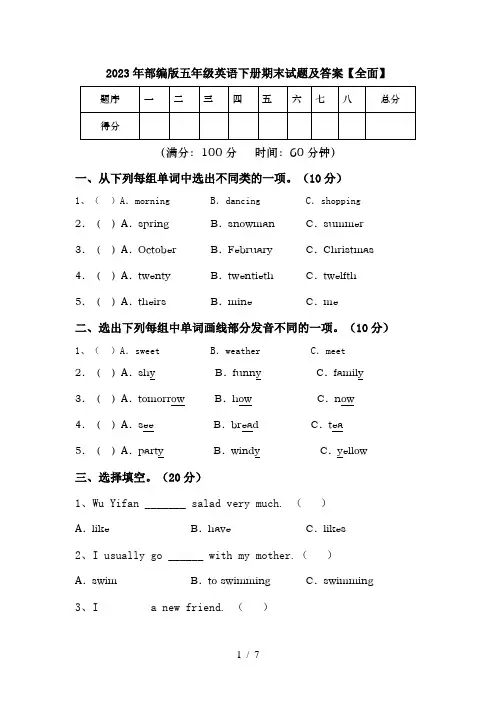
2023年部编版五年级英语下册期末试题及答案【全面】(满分:100分时间:60分钟)一、从下列每组单词中选出不同类的一项。
(10分)1、()A.morning B.dancing C.shopping 2.()A.spring B.snowman C.summer 3.()A.October B.February C.Christmas 4.()A.twenty B.twentieth C.twelfth 5.()A.theirs B.mine C.me二、选出下列每组中单词画线部分发音不同的一项。
(10分)1、()A.sweet B.weather C.meet2.()A.shy B.funny C.family 3.()A.tomorrow B.how C.now 4.()A.see B.bread C.tea5.()A.party B.windy C.yellow三、选择填空。
(20分)1、Wu Yifan _______ salad very much. ()A.like B.have C.likes2、I usually go ______ with my mother.()A.swim B.to swimming C.swimming 3、I a new friend. ()A.have B.has C.Is4、_______ our school! ()A.Welcome B.Welcome to C.Welcome in5、Teachers' Day is ______ September 10th. ()A.on B.in C.at6、Many girls ____on the shoe, and it only_____ Cinderella. ()A.try, fit B.tries, fits C.try, fits7、My brother ___________ books now. ()A.reads B.reading C.is reading8、There isn’t water in the river. ()A.some B.a C.any9、—What's your ________ job? ()—________ a cook.A.mother; She's B.brother's; He's C.mother's; She 10、—________ are you going? ()—I’m going to the cinema.A.What B.When C.Where四、用形容词和副词的比较级或最高级形式填空。
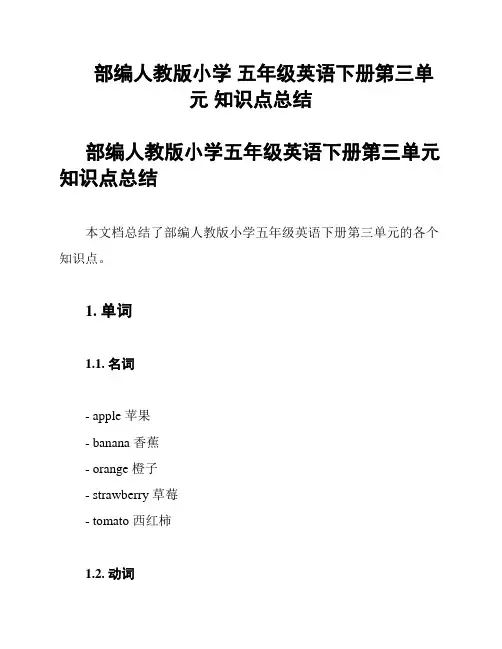
部编人教版小学五年级英语下册第三单元知识点总结部编人教版小学五年级英语下册第三单元知识点总结本文档总结了部编人教版小学五年级英语下册第三单元的各个知识点。
1. 单词1.1. 名词- apple 苹果- banana 香蕉- orange 橙子- strawberry 草莓- tomato 西红柿1.2. 动词- eat 吃- drink 喝- like 喜欢- love 爱- want 想要2. 句子2.1. 询问喜好- What do you like?- Do you like apples?2.2. 表达喜好- I like bananas.- He loves strawberries.2.3. 表达想要- I want an apple.- She wants to drink water.3. 语法3.1. 疑问句- What do you want?- Do you like tomatoes?4. 练题请根据所学词汇和句型,完成以下练。
1. 用英语表达“我喜欢吃草莓。
”2. 描述一下你喜欢的水果。
3. 用英语询问他想要吃什么。
4. 写出一个包含疑问句的句子。
5. 总结通过本单元的研究,我们学会了描述喜好和想要的事物,并研究了一些水果的英文名称。
同时,我们也研究了一些基本的疑问句的构造。
这些知识点为我们在日常生活中进行简单交流提供了基础。
以上是对部编人教版小学五年级英语下册第三单元知识点的总结。
---(The above document is a summary of the key points covered inUnit 3 of the 5th-grade English textbook by the People's Education Press. It provides a list of vocabulary words, sample sentences, grammar structures, and exercises related to expressions of preferences and desires, as well as the names of some fruits in English.)。

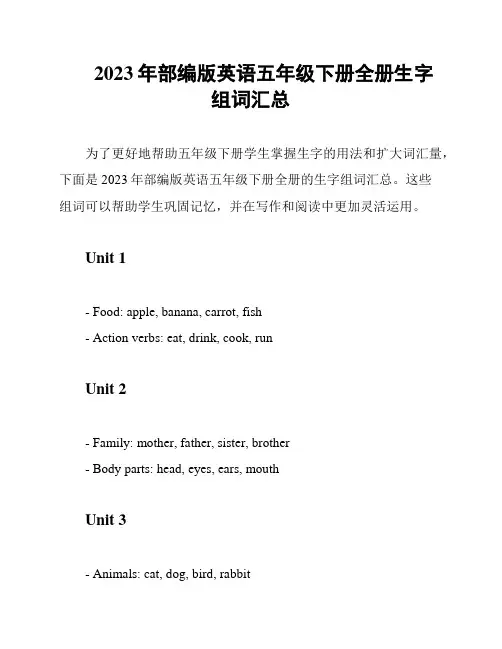
2023年部编版英语五年级下册全册生字组词汇总为了更好地帮助五年级下册学生掌握生字的用法和扩大词汇量,下面是2023年部编版英语五年级下册全册的生字组词汇总。
这些组词可以帮助学生巩固记忆,并在写作和阅读中更加灵活运用。
Unit 1- Food: apple, banana, carrot, fish- Action verbs: eat, drink, cook, runUnit 2- Family: mother, father, sister, brother- Body parts: head, eyes, ears, mouthUnit 3- Animals: cat, dog, bird, rabbit- Adjectives: big, small, fast, slowUnit 4- School: teacher, student, book, pen- Subjects: math, English, science, art Unit 5- Weather: sunny, cloudy, rainy, windy- Seasons: spring, summer, autumn, winter Unit 6- Clothes: hat, shirt, dress, pants- Colors: red, blue, yellow, greenUnit 7- Transport: car, bus, bike, train- Places: park, supermarket, hospital, libraryUnit 8- Toys: ball, doll, toy car, teddy bear- Actions: play, sing, dance, draw以上是2023年部编版英语五年级下册全册的生字组词汇总。
希望学生们能通过这些词汇的训练,提升英语听说读写的能力,并在日常生活中灵活运用。
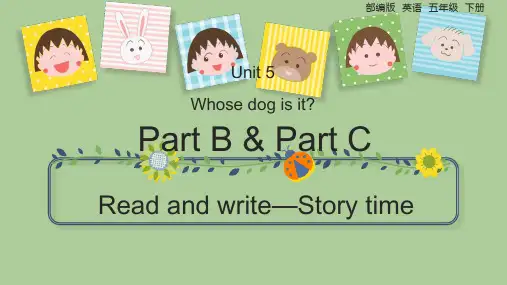
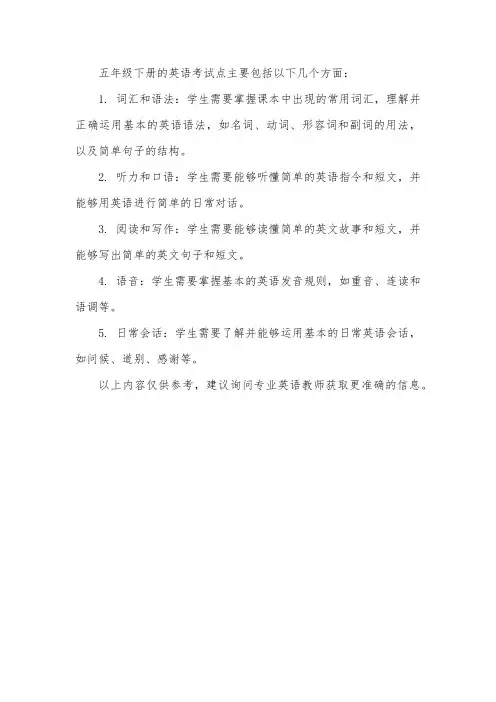
五年级下册的英语考试点主要包括以下几个方面:
1. 词汇和语法:学生需要掌握课本中出现的常用词汇,理解并正确运用基本的英语语法,如名词、动词、形容词和副词的用法,以及简单句子的结构。
2. 听力和口语:学生需要能够听懂简单的英语指令和短文,并能够用英语进行简单的日常对话。
3. 阅读和写作:学生需要能够读懂简单的英文故事和短文,并能够写出简单的英文句子和短文。
4. 语音:学生需要掌握基本的英语发音规则,如重音、连读和语调等。
5. 日常会话:学生需要了解并能够运用基本的日常英语会话,如问候、道别、感谢等。
以上内容仅供参考,建议询问专业英语教师获取更准确的信息。
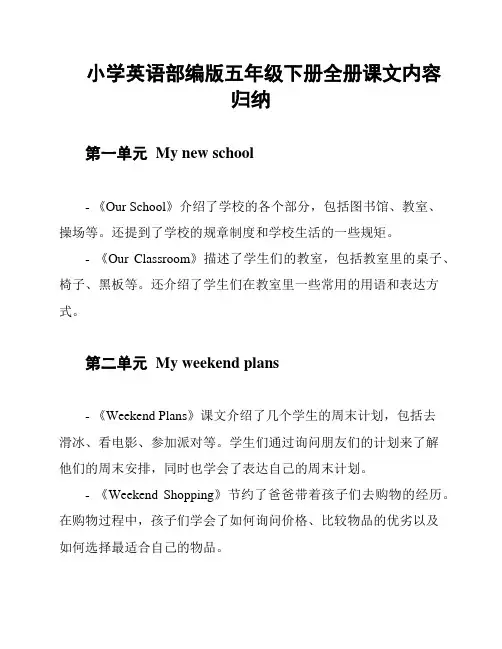
小学英语部编版五年级下册全册课文内容归纳第一单元 My new school- 《Our School》介绍了学校的各个部分,包括图书馆、教室、操场等。
还提到了学校的规章制度和学校生活的一些规矩。
- 《Our Classroom》描述了学生们的教室,包括教室里的桌子、椅子、黑板等。
还介绍了学生们在教室里一些常用的用语和表达方式。
第二单元 My weekend plans- 《Weekend Plans》课文介绍了几个学生的周末计划,包括去滑冰、看电影、参加派对等。
学生们通过询问朋友们的计划来了解他们的周末安排,同时也学会了表达自己的周末计划。
- 《Weekend Shopping》节约了爸爸带着孩子们去购物的经历。
在购物过程中,孩子们学会了如何询问价格、比较物品的优劣以及如何选择最适合自己的物品。
- 《Busy Weekend》故事中的孩子们都有一个忙碌的周末。
他们分别参加了电影俱乐部、游泳班和英语角。
通过这个故事,我们了解了孩子们丰富多彩的课余生活。
第三单元 My favorite subject- 《My Favorite Subject》课文中学生们谈论了自己最喜欢的学科,并表达了自己对不同学科的喜好和理由。
他们之间互相交流和讨论,分享了不同学科的特点和魅力。
- 《Music Class》课文介绍了一个音乐课堂上的情景,老师教导学生们如何演奏乐器和唱歌。
学生们通过参与音乐课堂活动,培养了音乐欣赏和艺术表达的能力。
- 《Art Class》课文中学生们在美术课上研究绘画和创作,他们展示了自己的作品并互相欣赏。
通过艺术创作,学生们培养了创造力和审美观。
第四单元 A picnic in the park- 《A Picnic Plan》课文描述了一场学生们组织的郊游活动,包括选择地点、准备食物和活动安排。
学生们通过一起筹划和组织活动,锻炼了团队合作和沟通能力。
- 《A Picnic in the Park》故事中的孩子们在公园里举行了一场愉快的野餐活动。
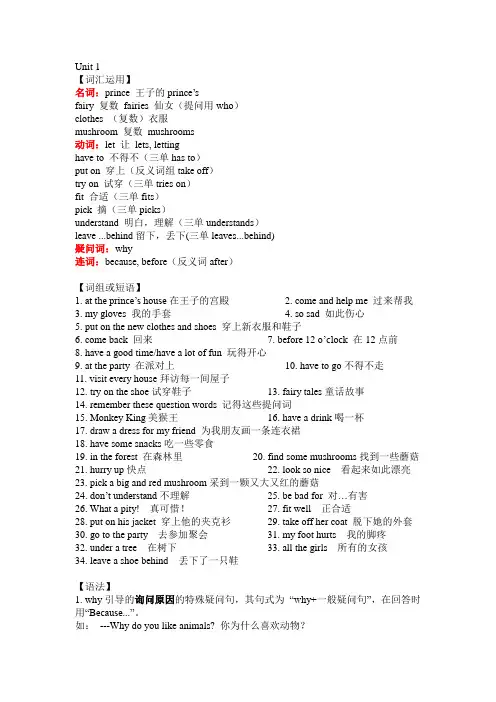
Unit 1【词汇运用】名词:prince 王子的prince’sfairy 复数fairies 仙女(提问用who)clothes (复数)衣服mushroom 复数mushrooms动词:let 让lets, lettinghave to 不得不(三单has to)put on 穿上(反义词组take off)try on 试穿(三单tries on)fit 合适(三单fits)pick 摘(三单picks)understand 明白,理解(三单understands)leave ...behind留下,丢下(三单leaves...behind)疑问词:why连词:because, before(反义词after)【词组或短语】1. at the prince’s house在王子的宫殿2. come and help me 过来帮我3. my gloves 我的手套4. so sad 如此伤心5. put on the new clothes and shoes 穿上新衣服和鞋子6. come back 回来7. before 12 o’clock 在12点前8. have a good time/have a lot of fun 玩得开心9. at the party 在派对上10. have to go不得不走11. visit every house拜访每一间屋子12. try on the shoe试穿鞋子13. fairy tales童话故事14. remember these question words 记得这些提问词15. Monkey King美猴王16. have a drink喝一杯17. draw a dress for my friend 为我朋友画一条连衣裙18. have some snacks吃一些零食19. in the forest 在森林里20. find some mushrooms找到一些蘑菇21. hurry up快点22. look so nice 看起来如此漂亮23. pick a big and red mushroom采到一颗又大又红的蘑菇24. don’t understand不理解25. be bad for 对…有害26. What a pity! 真可惜!27. fit well 正合适28. put on his jacket 穿上他的夹克衫29. take off her coat 脱下她的外套30. go to the party 去参加聚会31. my foot hurts 我的脚疼32. under a tree 在树下33. all the girls 所有的女孩34. leave a shoe behind 丢下了一只鞋【语法】1. why引导的询问原因的特殊疑问句,其句式为“why+一般疑问句”,在回答时用“Because...”。
小学英语部编版常见多音字汇总1. 基本介绍多音字指的是在不同的语境下,发音相同或相近但意义不同的汉字。
在小学英语部编版教材中,常见的多音字主要包括以下几个方面的内容。
2. 多音字列表下面是一些常见的多音字及其对应的发音和意义。
1. 玩(wán):可以表示玩耍、娱乐等意思;也可以表示表玩具、玩乐器等。
玩 (wán):可以表示玩耍、娱乐等意思;也可以表示表玩具、玩乐器等。
2. 忍(rěn):可以表示忍受、忍耐的意思;也可以表示忍住、忍下等。
忍(rěn):可以表示忍受、忍耐的意思;也可以表示忍住、忍下等。
3. 青(qīng):可以表示颜色的名称,如青色;还可以表示年轻、朝气等。
青(qīng):可以表示颜色的名称,如青色;还可以表示年轻、朝气等。
4. 取(qǔ):可以表示拿取、采摘等意思;也可以表示获得、挑选等。
取(qǔ):可以表示拿取、采摘等意思;也可以表示获得、挑选等。
5. 行 (xíng):可以表示走路、行走的意思;还可以表示办事、做事等。
行(xíng):可以表示走路、行走的意思;还可以表示办事、做事等。
3. 举例说明以下是一些例句,帮助学生更好地理解这些多音字的用法。
- 我喜欢在公园里玩球。
(wán)玩球。
(wán)- 小明会玩吉他。
(wán)玩吉他。
(wán)- 老师要我们要忍着不说话。
(rěn)忍着不说话。
(rěn)- 不管遇到什么困难,我们都要坚持忍下去。
(rěn)忍下去。
(rěn) - 这本书的封面是青色的。
(qīng)青色的。
(qīng)- 他还年轻,正值青春年华。
(qīng)青春年华。
(qīng)- 我去超市取了些水果。
(qǔ)取了些水果。
(qǔ)- 努力研究是获得好成绩的关键,我们要抓住取得这个机会。
(qǔ)取得这个机会。
(qǔ)- 请你在这里等一下,我去办点行李。
(xíng)行李。
(xíng)- 她在家里忙着行家务事。
2023年部编版五年级英语下册期末考试及答案【可打印】题序一二三四五六七八九十总分得分(满分:100分时间:60分钟)(听力部分40分)一、听录音,选出你所听到的单词,听两遍。
(10分)( )1. A.dinner B.letter C.winter( )2. A.feel B.leaves C.live( )3. A.snow B.roll C.show( )4. A.September B.December C.November( )5. A.shopping B.swimming C.morning二、听录音,选择正确的图片,读两遍。
(10分)( ) 1. A. B.( ) 2. A.B.( ) 3. A.B.( ) 4. A.B.( ) 5. A.B.三、听录音,选择正确的答语,读两遍。
(10分)( ) 1. A.I'd like some rice. B.Thank you. C.She's my mother. ( ) 2. A.Wonderful! B.Here you are. C.It's 12 o'clock.( ) 3. A.An art book B.Yes, I do. C.They are my socks. ( ) 4. A.I can sing. B.I like milk. C.It's time to get up. ( ) 5. A.Good morning. B.Yes, there is. C.Let's go to school. 四、听录音,根据所听内容补全短文,听两遍。
(10分)My name is Bob. I’m a ____ ____ here.In my school, there are some ____ and a nice ____ ____. It’s on the ____ ____. There are many books in it. I like ____ in it. Today, my friend Tom gives me a beautiful ____. It has no ____ or ____. But it can ____. Do you know it?(笔试部分60分)五、单项选择,将正确答案序号填在括号里。
小学英语部编版五年级下册全册日积月累默写单1. Unit 1- Words:- apple, banana, cake, egg, fish, grape, hamburger, ice cream, juice, kiwi- Sentences:- I have an apple.- Do you like bananas?- She likes cake.- He eats eggs for breakfast.- I don't like fish.- We have grapes.- He likes hamburgers.- Can I have some ice cream?- Would you like some juice?- Have you tried kiwi?2. Unit 2- Words:- library, bookstore, park, supermarket, hospital, post office, museum, cinema, restaurant, zoo- Sentences:- Let's go to the library.- We can buy books at the bookstore.- They play in the park.- Mom buys groceries at the supermarket.- Dad works at the hospital.- I need to mail a letter at the post office.- We visit the museum.- We watch a movie at the cinema.- They have dinner at the restaurant.- We see animals at the zoo.3. Unit 3- Words:- Sentences:- We watch TV in the living room.- She talks on the telephone.- He listens to the radio.- Mom takes pictures with the camera.- We watch movies on the DVD player.- Dad does laundry with the washing machine.- We store food in the refrigerator.- I heat food in the microwave.- The air conditioner keeps us cool.4. Unit 4- Words:- January, February, March, April, May, June, July, August, September, October, November, December- Sentences:- My birthday is in January.- We celebrate Valentine's Day in February.- March is the beginning of spring.- April showers bring May flowers.- June is the start of summer vacation.- We have picnics in July.- August is usually hot.- September is the beginning of the school year.- We celebrate Halloween in October.- November is the time for Thanksgiving.- December is a festive month.5. Unit 5- Words:- breakfast, lunch, dinner, soup, salad, sandwich, pasta, pizza, fruit, dessert- Sentences:- I eat breakfast in the morning.- What's for lunch?- We have dinner at home.- Mom makes soup for dinner.- Do you like salad?- He eats a sandwich for lunch.- We have pasta for dinner.- Pizza is my favorite food.- I like to eat fruits.- Can I have dessert after dinner?6. Unit 6- Words:- run, jump, skip, swim, dance, sing, play basketball, play soccer, ride a bike, do gymnastics- Sentences:- I like to run in the park.- Can you jump high?- We skip rope during recess.- She swims in the pool.- They dance in the ballet class.- He sings in the choir.- We play basketball after school.- They play soccer on weekends.- I ride a bike in the park.- She does gymnastics at the gym.以上是小学英语部编版五年级下册全册日积月累默写单的内容。
小学英语部编版五年级下册全册课文内容归纳Unit 1: Family and Friends- Lesson 1: I Have a Big Family- Lesson 2: Chores Around the House- Lesson 3: My Best Friend- Lesson 4: Our HobbiesUnit 2: My School Life- Lesson 1: A New Classmate- Lesson 2: School Facilities- Lesson 3: School Activities- Lesson 4: My Favorite SubjectUnit 3: Travel and Adventure- Lesson 1: Travel Plans- Lesson 2: On a Camping Trip- Lesson 3: An Exciting Adventure- Lesson 4: My Dream VacationUnit 4: Nature and Environment- Lesson 1: Different Types of Weather- Lesson 2: Recycling and Protecting the Earth - Lesson 3: Animals in the Wild- Lesson 4: Exploring the RainforestUnit 5: Festivals and Celebrations- Lesson 1: New Year Celebrations- Lesson 2: Traditional Festivals- Lesson 3: My Birthday Party- Lesson 4: Celebrating with FriendsUnit 6: Health and Sports- Lesson 1: Healthy Habits- Lesson 2: Sports and Games- Lesson 4: Let's Exercise- Lesson 3: Online Safety- Lesson 4: Technology in the FutureUnit 8: Art and Culture- Lesson 1: Different Types of Art- Lesson 2: Traditional Chinese Art- Lesson 3: Music and Dance- Lesson 4: Enjoying a Theater PerformanceUnit 9: Food and Nutrition- Lesson 1: Types of Food- Lesson 2: Healthy Eating Habits- Lesson 3: Cooking with Parents- Lesson 4: Trying New FoodsUnit 10: Everyday Life- Lesson 1: Daily Routines- Lesson 2: My Neighborhood- Lesson 3: Going Shopping- Lesson 4: Weekend Activities以上是小学英语部编版五年级下册全册课文内容的归纳总结。
部编英语五年级下册课文重要语法点汇总1. 现在进行时现在进行时表示正在进行的动作或当前的状态。
构成方式为:be动词+动词ing形式。
例如:I am reading a book.2. 一般过去时一般过去时表示过去发生的动作或状态。
构成方式为:be动词过去式+动词过去式。
例如:I visited my grandparents last weekend.3. 一般将来时一般将来时表示将来要发生的动作或状态。
构成方式为:will/shall + 动词原形,或者be going to + 动词原形。
例如:I will go to the zoo tomorrow.4. 被动语态被动语态表示动作的承受者。
构成方式为:be动词+过去分词。
例如:A book was given to me.5. 形容词比较级和最高级形容词比较级表示两者之间的比较,构成方式为:在形容词后面加-er。
例如:This book is heavier than that one.形容词最高级表示三者以上的比较,构成方式为:在形容词后面加-est。
例如:This is the heaviest book.6. 名词所有格名词所有格表示某物的归属。
构成方式为:在名词后面加-'s,或者在名词后面加一个空格再加'。
例如:This is Tom's book.7. 疑问词疑问词用于提问,包括:what(什么)、who(谁)、where (哪里)、when(什么时候)、why(为什么)、how(怎样)。
例如:What is your name?8. 特殊疑问句特殊疑问句是以疑问词开头的句子,用于询问特定信息。
例如:Where is the library?9. 祈使句祈使句是用来给出命令、建议或请求的句子。
例如:Please write your name on the paper.10. 宾语从句宾语从句是句子中的一个从句,作为动词或介词的宾语。
部编版小学五年级英语下册期末知识点汇总第一单元一、重点词汇eat breakfast吃早餐have...class 上··课play sports 进行体育运动exercise 活动,运动do morning exercises做早操eat dinner吃晚饭clean my room 打扫我的房间go for a walk 散步go shopping 去购物take学习,上(课)dancing 舞蹈take a dancing class 上舞蹈课a.m.上午p.m.下午usually 通常地二、其他日常活动get up起床eat lunch吃午饭go to bed 上床睡觉wash my face洗脸wash my clothes 洗我的衣服watch TV看电视play ping-pong打乒乓球play the pipa弹琵琶go swimming 去游泳go running去跑步do homework 做作业do kungfu练武术play football踢足球play basketball打篮球三、语音cl→[cl] :cleanclockclasscleverpl→[pl] :plateeggplantpleaseplay注意:cl 和pl 放在词尾与 e 结合变为cle 和ple 时发音不同。
四、频度副词always总是,一直(100%)usually通常(80%)often 经常(60%)sometimes有时(30%)五、疑问词why 为什么when 什么时候六、重点句型1、询问别人什么时候做某事的句型及回答。
句型结构:问:When do you+动词短语原形+其他?(你/你们什么时候做某事?)答:I/we(+频度副词)+动词短语原形+at+具体时间. (我/我们通常在几点做某事。
)例:When do you go to bed?(你什么时候上床睡觉?)I go to bed at 9:00 p.m.(我晚上九点上床睡觉。
)注意:当主语是第三人称单数(he,she,it,单个人名或单数名词)时,助动词do要变成does。
句型结构是:When does+主语(第三人称单数)+动词短语原形+其他?2、询问别人周末做什么的句型及回答。
句型结构:问:What do you do on the weekend?(你周末做什么?)答:I(+频度副词)+动词(短语)+其他。
例:What do you do on the weekend?(你周末做什么?)I usually read books. (我通常看书。
)注意:当主语是第三人称单数(he,she,it,单个人名或单数名词)时,助动词do要变成does。
句型结构是:What does+主语(第三人称单数)+do+on the weekend?第二单元一、重点词汇spring 春天summer 夏天autumn秋天winter 冬天season季节picnic 野餐go on a picnic 去野餐pick摘pick apples 摘苹果snowman雪人make a snowman 堆雪人go swimming去游泳which 哪一个best最because 因为vacation 假期二、其他1、形容天气的形容词:hot 炎热的warm 暖和的rainy多雨的windy 多风的foggy有雾的cold 寒冷的cool凉爽的sunny晴朗的cloudy 多云的snowy下雪的2、由go构成的活动短语:go swimming去游泳go shopping去购物go boating 去划船go skating去滑冰go hiking去远足go fishing去钓鱼三、语音br →[br]: brownlibrarybrotherumbrellagr→[gr] : greengrapes grandpagrow四、重点句型1、询问别人天气怎么样的句型及回答。
句型结构:问:What’s the weather like+时间+地点?(··天气怎么样?)答:It’s+表示天气的形容词.例:What’s the weather like in winter in Beijing?(北京冬天的天气怎么样)It’s cold and windy(有风而且寒冷。
)2、询问别人最喜欢的季节句型及回答。
句型结构:问:Which season do you like best? (你最喜欢的季节是哪一个?)答:I like+季节+best. 或直接说季节名称。
同义句还有:What’s your favourite season?3、询问别人喜欢某个季节的原因的句型及回答。
句型结构:问:Why do you like+季节名称?或直接用“Why”来提问。
答:一般要用“because”引导的句子来说明理由,可以从天气相关的活动等方面来说。
例:(1)Why do you like spring?(你为什么喜欢春天?)Because I can go on a picnic.(因为我能去野餐。
)(2)Why do you like summer?(你为什么喜欢夏天?)Because I can go swimming.(因为我能去游泳。
)(3)Why do you like autumn?(你为什么喜欢秋天?)Because I can pick apples.(因为我能摘苹果。
)(4)Why do you like winter?(你为什么喜欢冬天?)Because I can make a snowman.(因为我能堆雪人。
)第三单元一重点词汇January一月February二月March三月April四月May 五月June六月July七月August 八月September 九月October十月November 十一月December十二月注意:1、月份的首字母一定要大写。
2、May没有缩写形式,September的缩写形式是“Sept”,其他月份单词的缩写形式都是由单词的前三个字母加“·”构成。
3、月份的缩写形式不用在句子中,只能单独使用。
4、表示“在几月”时,要在月份单词前面加介词in。
二、常用节假日名称New Year’s Day元旦(1.1)Tree Planting Day 植树节(3.12)Easter 复活节(每年春分月圆之后第一个星期日)April Fool’s Day愚人节(4.1)May Day 劳动节(5.1)Mother’s Day母亲节(五月第二个周日)Children’s Day 儿童节(6.1)Father’s Day父亲节(六月第三个周日)Teacher’s Day教师节(9.10)National Day国庆节(10.1)Mid-Autumn Day 中秋节(农历八月十五)Thanksgiving Day 感恩节(11月第4个周四)Christmas圣诞节(12.25)summer vacation暑假(July and August )winter vacation寒假三、语音ch→[ts]: Chinachickenlunchteachersh→[s]: sheepfishshirtshorts四、活动名称sports meet 运动会Easter party 复活节聚会school trip 学校旅行Chinese test 语文测试singing contest歌咏比赛birthday party生日聚会五、介词in 、on、at的用法。
1、in +上午/下午/晚上/月份/季节/年份。
如:in the morning,in April,in winter,in 20152、on+具体的某一天。
如:on Monday,on April 3rd,on Friday morning3、at +具体的时间点或与其他词构成固定搭配。
如:at 6:00 ,at noon六、重点句型1、问答某个活动或节日在几月份的句型及回答。
句型结构:问:When is+ the +活动或节日名称?(注意:节日开头字母要大写)答:It’s in+月份.例:(1)When is the trip this year ? (今年的旅行在什么时候?)It’s in October. (在十月)(2)When is Christmas?(圣诞节在什么时候?)It’s in December.(在十二月。
)2、询问别人将要做什么的句型及回答。
句型结构:问:What will you do+其他?答:I will...=I’ll...例:What will you do for your mum on Mother’s Day?(母亲节你将为你妈妈做什么?)I’ll give her some flowers.(我将送给她一些花。
)3、表达“我们将要··”的句型。
We’ll/We will + 动词原形. 这是一个一般将来时的句子,表示将来某个时间要发生的动作或事情。
例:We’ll have a school trip.(我们将有一次学校旅行。
)We’ll have a singing contest.(我们将有一次歌咏比赛。
)We’ll take a dancing class.(我们将要上一节舞蹈课。
)第四单元一、重点词汇first(1st) 第一second (2nd)第二third (3rd)第三fourth (4th)第四fifth(5th) 第五sixth(6th) 第六seventh(7th)第七eighth(8th)第八ninth(9th)第九tenth(10th) 第十eleventh(11th)第十一twelfth(12th)第十二thirteenth(13th)第十三fourteenth(14th) 第十四fifteenth(15th)第十五sixteenth(16th)第十六seventeenth(17th) 第十七eighteenth(18th) 第十八nineteenth(19th) 第十九twentieth(20th) 第二十twentieth-first(21th) 第二十一twentieth-second(22nd) 第二十二twentieth-third(23rd) 第二十三thirtieth(30th) 第三十二、用序数词表示具体的日期,其中“日”,再说“日”在英语中,“几月几日”可以先说“月”要用序数词。
如果要表示某年某月某日,通常按照“月、日、年”的顺序。
例如:March3rdJune 1st, 2014三、语音th→/θ/ : threethinthirteenmathsth→/e/ : thisthatmotherbrother四、基数词变序数词的口诀记忆基变序有规律,结尾加上th;一二三特殊记,结尾各是st, nd, rd;八减t九去e,f来把ve替;y改为ie, 结尾仍有th;若是遇到几十几,只变个位就可以。